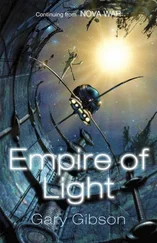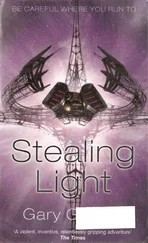“How you learn to climb, up here” Skinner said, “the first thing is, you don’t look down. Second thing is, you keep one hand and one foot on the bridge all the time. This guy, he didn’t know that. And those shoes of his. He just went off, backward. Never made a sound. Sort of… graceful.”
Yamazaki shivered.
“But I kept climbing. Rain had quit, light was coming. Stayed.”
“How did you feel?” Yamazaki asked. Skinner blinked. “Feel?”
“What did you do then?”
“I saw the city.”
Yamazaki rode Skinner’s lift down to where stairs began, its yellow upright cup like a piece of picnicware discarded by a giant. All around him, now, the rattle of an evening’s commerce, and from a darkened doorway came the slap of cards, a woman’s laughter, voices raised in Spanish. Sunset pink as wine, through sheets of plastic that snapped like sails in a breeze scented with frying foods, woodsmoke, a sweet oily drift of cannabis. Boys in ragged leather crouched above a game whose counters were painted pebbles.
Yamazaki stopped. He stood very still, one hand on a wooden railing daubed with hyphens of aerosol silver. Skinner’s story seemed to radiate out, through the thousand things, the unwashed smiles and the smoke of cooking, like concentric rings of sound from some secret bell, pitched too iow for the foreign, wishful ear.
We are come not only past the century’s closing, he thought, the millennium’s turning, but to the end of something else. Era? Paradigm? Everywhere, the signs of closure.
Modernity was ending.
Here, on the bridge, it long since had.
He would walk toward Oakland now, feeling for the new thing’s strange heart.
Tuesday, she just wasn’t on. Couldn’t proj. No focus. Bunny Malatesta, the dispatcher, could feel it, his voice a buzz in her ear.
“Chev, don’t take this the wrong way, but you got like the monthlies or something?”
“Fuck off, Bunny.”
“Hey, I just mean you’re not your usual ball of fire today. All I mean.”
“Gimme a tag.”
“655 Mo, fifteenth, reception.”
Picked up, made it to 555 Cali, fifty-first floor. Pulled her tag and back down. The day gone gray after morning’s promise.
“456 Montgomery, thirty-third, reception, go freight.”
Pausing, her hand in the bike’s recognition-loop. “How come?”
“Says messengers carvin’ graffiti in the passenger elevators. Go freight or they’ll toss you, be denied access, at which point Allied terminates your employment.”
She remembered seeing Ringer’s emblem carved into the inspection plate in one of 456’s passenger elevators. Fucking Ringer. He’d defaced more elevators than anyone in history. Carried around a regular toolkit to do it with.
456 sent her to EC with a carton wider than she was supposed to accept, but that was what racks and bungles were for, and why give the cage-drivers the trade? Bunny buzzed her on her way out and gave her to Beale, the cafeteria on the second floor. She guessed that would be a woman’s purse, done up in a plastic bag from the kitchen, and she was right. Brown, sort of lizardskin, with a couple of green sprouts stuck in the corners of the bag. Women left their purses, remembered, called up, got the manager to send for a messenger. Good for a tip, usually. Ringer and some of the others would open them up, go through the contents, find drugs sometimes. She wouldn’t do that. She thought about the sunglasses.
She couldn’t get a run today. There was no routing in effect at Allied, but sometimes you’d get a run by accident; pick up here, drop off there, then something here. But it was rare. When you worked for Allied you rode harder. Her record was sixteen tags in a day; like doing forty at a different company.
She took the purse to Fulton at Masonic, got two flyers after the owner checked to see everything was there.
“Restaurant’s supposed to take it to the cops” Chevette said. “We don’t like to be responsible.” Blank look from the purse-lady, some kind of secretary. Chevette pocketed the fives.
“298 Alabama” Bunny said, as if offering her some pearl of great price. “Tone those thighs…”
Bust her ass out there to get there, then she’d pick up and do it. But she couldn’t get on top of it, today.
The asshole’s sunglasses…
“For tactical reasons” the blonde said, “we do not currently advocate the use of violence or sorcery against private individuals.”
Chevette had just pumped back from Alabama Street, day’s last tag. The woman on the little CNN flatscreen over the door to Bunny’s pit wore something black and stretchy pulled over her face, three triangular holes cut in it. Blue letters at the bottom of the screen read FIONA X-SPOKESPERSON– SOUTH ISLAND LIBERATION FRONT.
The overlit fluorescent corridor into Allied Messengers smelled of hot styrene, laser printers, abandoned running-shoes, and stale bag lunches, this last tugging Chevette toward memories of some unheated day-care basement in Oregon, winter’s colorless light slanting in through high dim windows. But now the street door banged open behind her, a pair of muddy size-eleven neon sneakers came pounding down the stairs, and Samuel Saladin DuPree, his cheeks speckled with crusty gray commas of road-dirt, stood grinning at her, hugely.
“Happy about something, Sammy Sal?”
Allied’s best-looking thing on two wheels, no contest whatever, DuPree was six-two of ebon electricity poured over a frame of such elegance and strength that Chevette imagined his bones as polished metal, triple-chromed, a quicksilver armature. Like those old movies with that big guy, the one who went into politics, after he’d got the meat ripped off him. Thinking about Sammy Sal’s bones made most girls want him to jump theirs, but not Chevette. He was gay, they were friends, and Chevette wasn’t too sure how she felt about all that anyway, lately.
“Fact is” Sammy Sal said, smearing dirt from his cheek with the back of one long hand, “I’ve decided to kill Ringer. And the truth, y’know, it makes you free…”
“Ho” Chevette said, “you musta pulled a tag over 456 today.”
“I did, dear, do that thing. All the way up, in a dirty freight elevator. A slow dirty freight elevator. And why?”
“Cause Ringer’s ’graved his tag in their brass, Sal, and their rosewood, too?”
“Eggs-ackly, Chevette, honey.” Sammy Sal undid the blue and white bandanna around his neck and wiped his face with it. “Therefore, his ass dies screaming.”
“and must begin, now, to systematically sabotage the workplace” Fiona X said, “or be branded an enemy of the human race.”
The door to the dispatch-pit, so thickly stapled with scheds, sub-charts, tattered Muni regs, and faxed complaints that Chevette had no idea what the surface underneath might look like, popped open. Bunny extruded his scarred and unevenly shaven head, turtle-like, blinking in the light of the corridor, and glanced up automatically, his gaze attracted by the tone of Fiona X’s sound-bite. His expression blanked at the sight of her mask, the mental channel-zap executed in less time than it had taken him to look her way. “You” he said, eyes back on Chevette, “Chevy. In here.”
“Wait for me, Sammy Sal” she said.
Bunny Malatesta had been a San Francisco bike messenger for thirty years. Would be still, if his knees and back hadn’t given out on him. He was simultaneously the best and the worst thing about messing for Allied. The best because he had a bike-map of the city hung behind his eyes, better than anything a computer could generate. He knew every building, every door, what the security was like. He had the mess game down, Bunny did, and, better still, he knew the lore, all the history, the stories that made you know you were part of something, however crazy it got, that was worth doing. He was a legend himself, Bunny, having Krypto’d the windshields of some seven police cars in the course of his riding career, a record that still stood. But he was the worst for those same reasons and more, because there wasn’t any bulishitting him at all. Any other dispatcher, you could cut yourself a little extra slack. But not Bunny. He just knew.
Читать дальше











